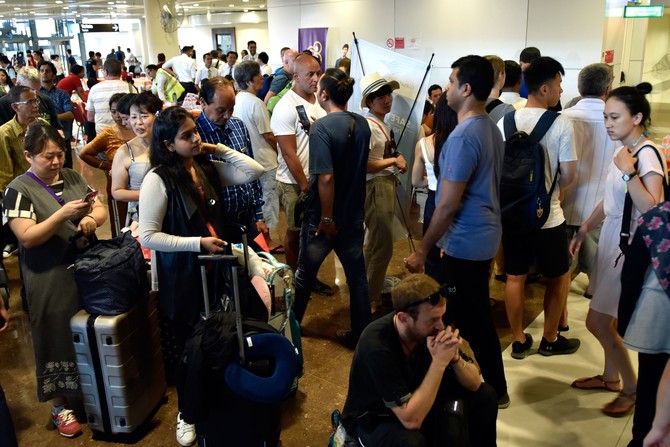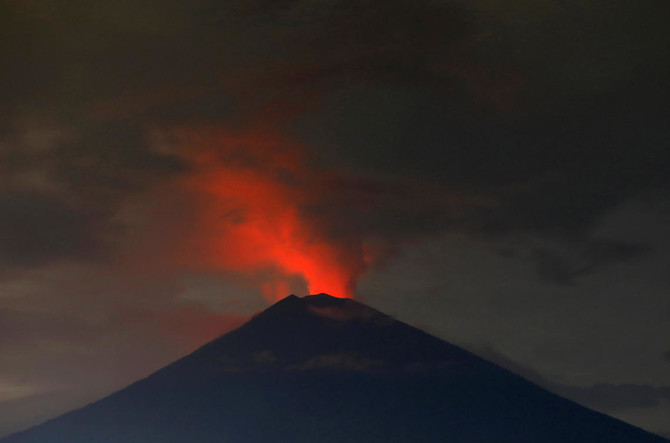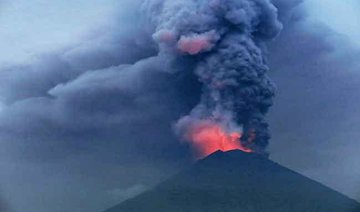DENPASAR, Indonesia: Thousands of foreign tourists were leaving Bali by plane Thursday after an airport shutdown sparked by a rumbling volcano, but some visitors were irate at not being able to get off the Indonesian island paradise sooner.
The alert level on Mount Agung remains at maximum. But a change in wind direction blew towering columns of ash and smoke away from the airport, prompting authorities to re-open the island’s main international gateway Wednesday afternoon.
That opened an eagerly awaited window for some of the 120,000 tourists stranded after the surge in volcanic activity grounded hundreds of flights, sparking travel chaos and forcing the evacuation of villagers living in the mountain’s shadow.
Ash is dangerous for planes as it makes runways slippery and can be sucked into their engines.
“Things are gradually getting back to normal,” said Bali airport spokesman Israwadi, who like many Indonesians goes by one name.
But that wasn’t much comfort to some visitors who came to relax in one of the world’s top travel destinations but have instead faced repeated flight cancelations, battles over insurance and torrential rain that has lashed the island.
“I have been stranded since Monday night,” said Australian Donna Lay.
“We have travel insurance, but mine doesn’t cover volcano so I’m just living off my money. I’m covered for health (insurance) but not for accommodation.”
Indonesian visitor Yayan was running out of patience.
“I have been waiting since November 27 (Monday),” said the man, whose flight has been canceled multiple times.
“I got no email or notification from the airline...They should have told me. I am at loss because I have to postpone my business — I have jobs that I need to handle.”
More than 4,500 people have now flown out of Bali’s main airport, authorities said, with around 3,200 of them on international flights.
However, the airport on nearby Lombok island — also a popular tourist destination — closed again Thursday after ash and smoke drifted in its direction.
The shifting wind was being caused by cyclone Cempaka which is battering Indonesia’s main Java island — west of Bali — and has left at least 19 people dead in severe flooding and landslides.
Millions of tourists visit palm-fringed Bali annually. The majority are Chinese, followed by Australians, Indians, Britons and Japanese, according to the immigration office, which added that nearly 25,000 foreigners live on the small Hindu-majority island.
Tens of thousands of Balinese have already fled their homes around the volcano — which last erupted in 1963, killing around 1,600 people.
As many as 100,000 will likely be forced to leave in case of a full eruption, disaster agency officials have said.
While some have refused to leave a 10-kilometer radius danger zone, tens of thousands have filled up evacuation centers, some with respiratory problems linked to the volcanic ash.
“In an evacuation center there are a lot of people so there are problems such as poor sanitation and diseases can be easily contagious,” said Dwi Putra Sudewa, a doctor volunteering at one center.
“One gets a cough and others can get it too.”
While the volcano appeared to be belching less ash and smoke on Thursday, experts warned a major eruption could still happen at any moment. Agung has already experienced a series of mini eruptions.
“The potential for an eruption is still there, but we cannot predict how big it’s going to be,” said Devy Kamil from the Indonesian volcanology agency.
Agung rumbled back to life in September, forcing the evacuation of 140,000 people living nearby. Its activity decreased in late October and many returned to their homes.
However, on Saturday the mountain sent smoke into the air for the second time in a week in what volcanologists call a phreatic eruption — caused by the heating and expansion of groundwater.
So-called cold lava flows have also appeared — similar to mud flows and often a prelude to the blazing orange lava of popular imagination.
Indonesia, the world’s most active volcanic region, lies on the Pacific “Ring of Fire” where tectonic plates collide, causing frequent volcanic and seismic activities.
Last year seven people were killed after Mount Sinabung on the western island of Sumatra erupted. A 2014 eruption at Sinabung killed 16.
Tourists leave as Bali’s volcano-hit airport gets back to business
Tourists leave as Bali’s volcano-hit airport gets back to business

Trial of former President Sarkozy sheds light on France’s back-channel talks with Libya’s Qaddafi

During the trial, Sarkozy has said he has “never ever betrayed” families of victims
PARIS: The monthslong trial of former French President Nicolas Sarkozy over the alleged illegal financing of his 2007 presidential campaign is shedding light on France’s back-channel talks with the government of then-Libyan leader Muammar Qaddafi.
Family members of terrorist attacks sponsored by Qaddafi’s regime have told the court they suspect that Sarkozy was willing to sacrifice the memories of their loved ones in order to normalize ties with Libya almost two decades ago.
French prosecutors on Thursday requested a seven-year prison sentence for the 70-year-old former leader. Sarkozy, who was president from 2007 to 2012, has denied all wrongdoing.
The trial, which started in January, is to continue until April 8, with Sarkozy’s lawyers to plead on the last day. The verdict is expected at a later date.
Some key moments in the trial have focused on talks between France and Libya in the 2000s, when Qaddafi was seeking to restore diplomatic ties with the West. Before that, Libya was considered a pariah state for having sponsored attacks.
French families of victims of a 1989 plane bombing told the court about their shock and sense of betrayal as the trial questioned whether promises possibly made to Qaddafi’s government were part of the alleged corruption deal.
The Lockerbie and UTA flight bombings
In 1988, a bomb planted aboard a Pam Am flight exploded while the plane was over the Scottish town of Lockerbie, killing 270 people from 21 countries, including 190 Americans.
The following year, on Sept. 19, 1989, the bombing of UTA flight 772 over Niger killed 170 people, including 54 French nationals on board, after an in-flight explosion caused by a suitcase bomb.
Both French and US investigations have tied both bombings to Libya, whose government had engaged in long-running hostilities with the US and other Western governments.
Now, families of victims are wondering whether French government officials close to Sarkozy promised to forget about the bombings in exchange for business opportunities with the oil-rich nation and possibly, an alleged corruption deal.
“What did they do with our dead?” Nicoletta Diasio, the daughter of a man who died in the bombing, has told the court, saying she wondered if the memories of the victims “could have been used for bartering” in talks between France and Libya.
During the trial, Sarkozy has said he has “never ever betrayed” families of victims. “I have never traded their fate for any compromise, nor pact of realpolitik,” he said.
Libya’s push to restore ties with the West
Libya was long a pariah state for its involvement in the 1980s bombings.
In 2003, it took responsibility for both the 1988 and 1989 plane bombings and agreed to pay billions in compensation to the victims’ families.
Qaddafi also announced he was dismantling his nuclear weapons program, which led to the lifting of international sanctions against the country.
Britain, France and other Western countries sought to restore a relationship with Libya for security, diplomatic and business purposes.
In 2007, Sarkozy welcomed Qaddafi to Paris with honors for a five-day official visit, allowing him to set up a bedouin tent near the Elysee presidential palace. Many French people still remember that gesture, feeling Sarkozy went too far to please a dictator.
Sarkozy said during the trial he would have preferred to “do without” Qaddafi’s visit at the time but it came as a diplomatic gesture after Libya’s release of Bulgarian nurses who were imprisoned and facing death sentences for a crime they said they did not commit.
Bulgarian nurses
On July 24, 2007, under an accord partially brokered by first lady Cecilia Sarkozy and EU officials, Libya released the five Bulgarian nurses and a Palestinian doctor.
The medics, who had spent over eight years in prison, faced death sentence on charges they deliberately infected hundreds of children with the AIDS virus in the late 1990s — an allegation they denied.
The release of the medics removed the last major obstacle to Libya’s rejoining the international community.
Sarkozy traveled to the capital, Tripoli, for talks with Qaddafi the day after the medics were returned to Bulgaria on a French presidential plane.
In court has spoken of his “pride to have saved those six persons.”
“If you did not discuss with Qaddafi, you’d not get the release of the nurses,” he said.
Libya’s spy chief at heart of questions
Accused of masterminding the attack on UTA Flight 772, Qaddafi’s brother-in-law and intelligence chief Abdullah Al-Senoussi was convicted in absentia to a life sentence by a Paris court in 1999 for the attack.
An international arrest warrant was issued for him and five other suspects.
Financial prosecutors have accused Sarkozy of having promised to lift the arrest warrant targeting Al-Senoussi in exchange for alleged campaign financing.
In 2005, people close to Sarkozy, who was at the time the interior minister, including his chief of staff Claude Guéant and junior minister Brice Hortefeux, traveled to Tripoli, where they met with Al-Senoussi.
Both Guéant and Hortefeux have told the court that it was a “surprise” meeting they were not aware of beforehand.
Al-Senoussi told investigative judges that millions of dollars were provided to support Sarkozy’s campaign. Accused of war crimes, he is now imprisoned in Libya.
Sarkozy has strongly denied that.
Qaddafi’s son accusations
Qaddafi’s son, Seif Al-Islam, told the French news network RFI in January that he was personally involved in giving Sarkozy 5 million dollars in cash.
Seif Al-Islam sent RFI radio a two-page statement on his version of events. It was the first time he talked to the media about the case since 2011.
He said Sarkozy initially “received $2.5 million from Libya to finance his electoral campaign” during the 2007 presidential election, in return for which Sarkozy would “conclude agreements and carry out projects in favor of Libya.”
He said a second payment of $2.5 million in cash was handed over without specifying when it was given.
According to him, Libyan authorities expected that in return, Sarkozy would end a legal case about the 1989 UTA Flight 771 attack — including removing his name from an international warrant notice.
Sarkozy strongly denied those allegations.
“You’ll never find one Libyan euro, one Libyan cent in my campaign,” he said at the opening of the trial in January. “There’s no corruption money because there was no corruption.”
Sarkozy turning his back to Qaddafi
The Libyan civil war started in February 2011, with army units and militiamen loyal to Qaddafi opposing rebels.
Sarkozy was the first Western leader to take a public stance to support the rebellion.
On Feb. 25, 2011, he said the violence by pro-Qaddafi forces was unacceptable and should not go unpunished. “Qaddafi must go,” he said at the time.
On March 10 that year, France was the first country in the world to recognize the National Transitional Council as the legitimate government of Libya.
“That was the Arab Spring,” Sarkozy told the court. “Qaddafi was the only dictator who had sent (military) aircrafts against his people. He had promised rivers of blood, that’s his expression.”
Muammar Qaddafi was killed by opposition fighters in Oct. 2011, ending his four-decade rule of the North African country.
Iran says nuclear talks will fail if US pushes for zero enrichment

- Iran says nuclear talks “will lead nowhere” if US pushes for zero enrichment - Nournews
DUBAI: Nuclear talks between Iran and the United States “will lead nowhere” if Washington insists that Tehran drop its uranium enrichment activity to zero, Deputy Foreign Minister Majid Takhtravanchi was quoted by state media on Monday as saying.
US special envoy Steve Witkoff reiterated Washington’s stance on Sunday that any new deal between the US and Iran must include an agreement not to enrich uranium, a possible pathway to developing nuclear bombs. Tehran says its nuclear energy program has entirely peaceful purposes.
“Our position on enrichment is clear and we have repeatedly stated that it is a national achievement from which we will not back down,” Takhtravanchi said.
During his visit to the Gulf region last week, US President Donald Trump said a deal was very close but that Iran needed to move quickly.
During his first, 2017-21 term as president, Trump withdrew the United States from a 2015 deal between Iran and world powers that placed strict limits on Tehran’s enrichment activities in exchange for relief from international sanctions.
Trump, who branded the 2015 accord one-sided in Iran’s favor, also reimposed sweeping US sanctions on Iran. The Islamic Republic responded by escalating enrichment.
Trump calls to probe Kamala Harris celebrity endorsements

WASHINGTON: US President Donald Trump said Monday he would launch a “major investigation” into his 2024 election rival Kamala Harris over celebrities who backed her failed run for the White House.
“Candidates aren’t allowed to pay for ENDORSEMENTS, which is what Kamala did, under the guise of paying for entertainment,” he posted on his Truth Social platform.
“I am going to call for a major investigation into this matter.”
Harris sought to harness star power from celebrities such as Beyonce and Oprah Winfrey in the election race.
Winfrey defended a $1 million payment to her production company from the Harris campaign to covers costs associated with the talk show legend hosting the presidential candidate.
Harris’s team, meanwhile, denied rumors that she paid pop megastar Beyonce $10 million to appear at a rally.
The Harris campaign listed one endorsement-related expenditure for $75 in its financial reports to an environmental advocacy group.
Trump, who won the election comfortably, received scant support from the entertainment industry at large but tapped into a targeted subset of well-known, hypermasculine influencers including podcast host Joe Rogan.
The president on Monday took aim at Beyonce, Winfrey and Bruce Springsteen, accusing Harris of paying the legendary rock star to perform at a rally in Georgia weeks before the election.
“How much did Kamala Harris pay Bruce Springsteen for his poor performance during her campaign for president?” he wrote.
“Why did he accept that money if he is such a fan of hers?“
Trump last week took to Truth Social to feud with Springsteen after the star told a British concert audience that his homeland is now ruled by a “corrupt, incompetent and treasonous administration.”
In return, the 78-year-old Republican said the star, nicknamed “the Boss,” is “Highly Overrated.”
Springsteen is an outspoken liberal critic of Trump and turned out for Harris after she replaced Democratic president Joe Biden in his abandoned reelection bid.
Iran summons British envoy after arrest of nationals

TEHRAN: Iran has summoned a British envoy in Tehran to protest the arrest of several of its nationals on charges of spying, state media reported Monday.
“Following the unjustified arrest of a number of Iranian nationals in the UK... the British charge d’affaires in Tehran was summoned on Sunday,” the IRNA news agency said, describing the arrests as “politically motivated.”
Three Iranian men appeared in a London court on Saturday charged with spying for the Islamic republic.
They were arrested on May 3 and identified as Mostafa Sepahvand, 39, Farhad Javadi Manesh, 44, and Shapoor Qalehali Khani Noori, 55, all living in London.
The British Home Office said they were irregular migrants who arrived by small boat or other means, such as hidden in a vehicle, between 2016 and 2022.
The alleged spying took place from August 2024 to February 2025, according to UK police.
A fourth man was arrested on May 9 as part of the investigation, but has now been released without charge, the police said in a statement.
Five Iranians were also arrested on May 3 in a separate investigation.
Four of the men — who had been held on suspicion of preparation of a terrorist act — had been released, although the investigation “remains active and is ongoing,” police said.
The fifth was earlier bailed to an unspecified date in May.
Indonesia searches for 19 people after landslide at gold mine in Papua

JAKARTA: Indonesian rescue teams were searching for 19 people missing after heavy rain caused a landslide at a gold mine in its easternmost region of Papua, officials said on Monday.
Torrential rain triggered a landslide late on Friday in a small-scale mine run by local residents in the Arfak mountains in West Papua province, said Abdul Muhari, the spokesperson of Indonesia's disaster mitigation agency.
The landslide hit temporary shelters used by the miners and killed at least one person and injured four with 19 others still missing, he added.
At least 40 rescuers with police and military personnel had been deployed to search for the missing, officials said.
Small-scale and illegal mining has often led to accidents in Indonesia, where mineral resources are located in remote areas in conditions difficult for authorities to regulate.
The rescuers started the search operation only on Sunday because it took at least 12 hours for teams to travel to the site, Yefri Sabaruddin, the head of the local rescue team, told Reuters on Monday.
"The damaged roads and mountainous tracks as well as bad weather hampered the rescue efforts," Yefri said.
The number of casualties could rise, he added.
At least 15 people died in the collapse of an illegal gold mine in West Sumatra province September last year after a landslide caused by heavy rains.
Another landslide in a gold mine on Sulawesi island killed at least 23 people in July last year.
















